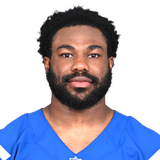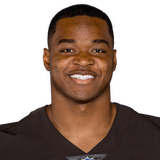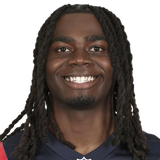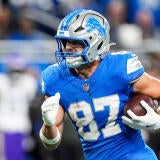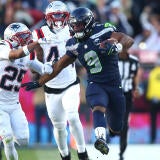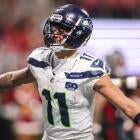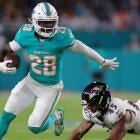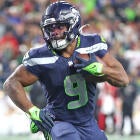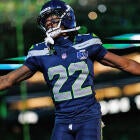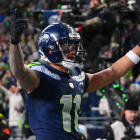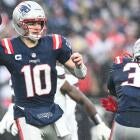NFL Fantasy Football Week 6 Lineup Decisions: Starts, Sits, Sleepers, Busts to know for every game
Dig into the players who might be tough start/sit calls in your lineup and who could be the breakout stars everyone wants in Week 7
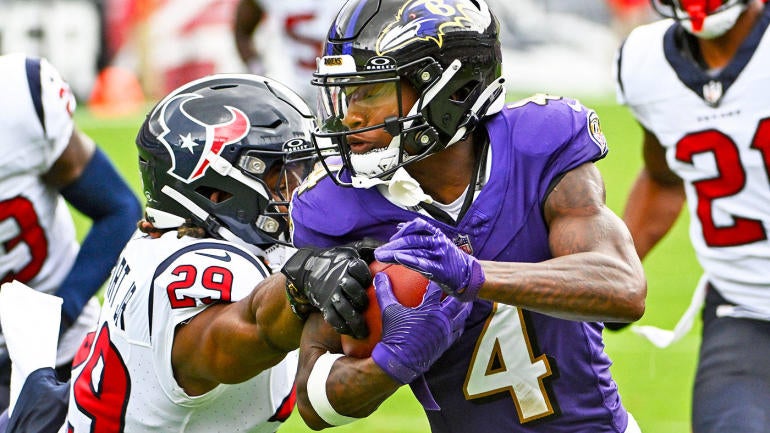
Fantasy Football is all about the matchups. Even though you drafted your team with certain hopes and intentions, your weekly lineup decisions shouldn't be determined by the order you picked your players in. You need to check who your players play and make sure you've got the right guys in -- and the wrong guys out.
It's too early to be absolutely sure on which matchups will be easy and which ones will be tough, but we can take some educated guesses based on healthy personnel, defensive schemes, track records and key details of offenses. The things we know can help us minimize the impact of the things we don't know. This should lead to better decisions being made.
We'll go through every game and highlight the players who aren't obvious starts and sits (because you don't need to be told to start Justin Jefferson). You should feel more comfortable starting or sitting players based on the information given, and feeling comfortable with your Fantasy lineup before the games start is the best feeling in the world.
It's also important to have a keen eye for matchups dictated by the remaining schedule. I am now updating my projected Strength of Schedule rankings our broken down by position available on SportsLine. My objective is to break down how the schedule affects every Fantasy relevant player for the upcoming four weeks, the playoff stretch and the entire season. You'll also be able to find my key takeaways on which players you should buy low, sell high and more trade advice.
There isn't a Broncos running back you'll have much confidence in starting because they'll all split the proverbial pie too much. I'd start McLaughlin over Williams, but I would rather start Brian Robinson, Alexander Mattison, Rachaad White, Jerome Ford and Rhamondre Stevenson.
| ||||||||||||||||||
LAST WEEK: Despite splitting first-half snaps almost evenly and losing out on second-half snaps considerably, McLaughlin made three splash plays of 21, 22 and 38 yards including a touchdown on a tipped-then-secured designed screen that pierced through the middle of the Jets defense. Those three touches were his best -- his other nine touches each failed to exceed 3 yards. And as mentioned two sentences ago, he played just 10 snaps in the second half when the Broncos were trailing.
FILM: McLaughlin has good vision and speed, both of which were essential in reading the Jets defense at the first and second levels and choosing the correct paths to run on his big plays. His lateral agility was a differentiator on his touchdown catch. McLaughlin's worst asset is his power as he just won't finish runs with physicality like his backfield mates do. But the biggest detriment is that he can't consistently overcome bad blocking, which has been a consistent problem for the Denver O-line all year and certainly something that impacted Javonte Williams in his first handful of games.
WHEN TRAILING: When the Jets were up by eight or more points in the second half, McLauglhin played 4 of 15 snaps and had two carries. That's in line with a trend we've seen from Denver all year: Of the 117 snaps they've played when down by eight or more points, McLaughlin has played 26 snaps (13 touches, seven at Chicago), Williams has played 27 snaps (15 touches, almost all against Miami) and Samaje Perine has played 58 snaps (13 touches) -- more than both backs combined. The only guy who's averaged a strong number on the ground in this specific situation? You guessed it -- McLaughlin (6.1 yards per carry).
CHIEFS: Tend to build leads on their opponents. They also have given up just four rushing plays of 12-plus yards this season, and that includes a fake punt run by the Vikings last week. Kansas City has given up one rushing TD to a running back this season. Impressive numbers considering they're giving up 4.5 yards per carry and rank in the bottom-10 in yards before contact and yards after contact. The secret? Teams don't run the ball that much against them (16.4 attempts per game, fourth-fewest) because ... they tend to build leads on their opponents.
CHIEFS: David Montgomery and Alexander Mattison are the only two running backs to tally at least 10 Fantasy points (PPR or non-PPR) against Kansas City this year. Both scored.
BRONCOS: When McLaughlin, Williams and Perine were all part of the Broncos game plan in their Week 3 blowout loss, Williams had the most work (13 touches) and the most PPR points (8.5). The only time a Denver back had 15-plus touches came in Week 1 when Williams had 17 against the Raiders (and had 9.7 PPR points, a season-high).
If I had supreme confidence in Baltimore not having much success on the ground then I'd start Flowers without hesitation. But Tennessee's run defense has weakened a bit and the Ravens could be apt to take advantage. Of course there's upside for Flowers to haul in a couple of long targets, and that really is what keeps him in the flex conversation. But I would rather start Christian Kirk, Marquise Brown, Michael Pittman and Jakobi Meyers as WR2 options this week.
| ||||||||||||||||||
It's a little gutsy to go with Hill, who has been inefficient for much of the year. We're counting on the Ravens outsmarting the big size of the Titans defensive line and utilizing Hill for his speed along the edges and in the passing game. His high-value touch share is the icing on the cake and hopefully can lead to him scoring just over 12 PPR points for the second week in a row. I'd take my chances with him over low-upside running backs like Gus Edwards, Antonio Gibson and Jonathan Taylor (for now he's low-upside).
| ||||||||||||||||||
LAST WEEK: I surmised that Flowers would be targeted more if the Ravens run game couldn't get going. Sure enough, it didn't, and Flowers saw a season-high 11 targets at Pittsburgh. Unfortunately, Flowers underwhelmingly caught just five balls for 73 yards with two drops that would have pushed his yardage over 100 had he held on to both targets.
AIR YARDS: Flowers was targeted downfield more last week than in any game this season with a 15.27 Average Depth of Target (ADOT). It was the first time he had a double-digit ADOT and more than six targets. He lined up wide on the majority of snaps (66.7%) and hitches were still his route of choice but there was more diversity there than before. It's also notable Flowers did this while sharing the field with Odell Beckham and Rashod Bateman back on the field.
TITANS: Run defense started the season strong but got smashed last week by Zack Moss and the Colts to the tune of 6.3 yards per carry and four explosive runs (they had allowed two total headed into the game). Moss beat a stacked box on his 56-yard TD scamper. And even when Richardson wasn't on the field the Colts averaged 4.7 yards per run against Tennessee.
TITANS PAST TWO: Against the Bengals and Colts, the Titans allowed at least 2.79 yards before contact per rush in each game and were decimated by zone-scheme runs (at least 6.0 rush yards per carry by RBs).
RAVENS RUN GAME: Have called zone runs half as many times as power runs even though they average a half-yard better per carry on zone runs. They'd be smart to do more of that this week against Tennessee. Hill has the team's best rushing average and highest rush EPA on zone runs.
HILL: In the three games he's played the most snaps in (Weeks 1, 2 and 5), he's played 24 of a possible 43 third-down snaps (56%) and 14 of 20 snaps inside the 10. He's smaller than Gus Edwards, but faster and more versatile, and it's given him extended opportunities for high-value touches.
TITANS PASS DEFENSE: Rank in the bottom-five in catch rate allowed to outside wide receivers (75.8%) but handle them well otherwise (12.5 yards per catch, 3.34 YAC/reception are both top-10). They're equally adept versus hitch routes and WR screens, Flowers' two most-run routes. Tennessee has allowed exactly 50% of pass attempts of 15-plus Air Yards to all wide receivers be completed for a bottom-five yards per catch allowed rate, but they're league average in YAC/reception and touchdowns allowed on those throws, and the numbers are a little bit better for them if you discount four hiccups in Week 1.
The only two games McLaurin posted good numbers in were Washington's 35-33 win over Denver in Week 2 and Washington's 34-31 OT loss to Philadelphia in Week 4. This matchup has an over/under of 42.5 points, tied for fourth-lowest of the week. Tack on the ascending secondary the Falcons seem to have and the Commanders' diffusion of targets and McLaurin is at best a low-end flex. I'd rather roll the dice on Drake London, Tyler Lockett or Garrett Wilson.
| ||||||||||||||||||
LAST WEEK: Hopeful that his target edge over his teammates would keep growing, and even in a favorable game script where the Commanders were trailing by three scores before halftime, McLaurin only saw five targets against the Bears' heavy zone coverage.
FILM: On the 10 third-down routes McLaurin ran last week, he drew extra coverage on four of them, got open on two of them (Howell threw elsewhere) and was a decoy on Curtis Samuel's touchdown. What happened? Sam Howell was getting rid of the ball quickly and to shorter distances as the Bears were getting some pressure on him. By the end of the game McLaurin's body language seemed dispirited.
COMMANDERS: Throw to their wideouts on 58.7% of their targets, which is below league average (but not as bad as, say, the Falcons at 36.4%). What makes that number worse is that McLaurin has just one more target (31) than Jahan Dotson (30), who has three more targets than Curtis Samuel (27). They're all nearly even after five games and each of them has had a turn leading in targets at least once.
FALCONS: Are expected to play a heavy dose of zone coverage, if only because the Commanders have struggled to be explosive against zone coverage this year. Atlanta also gave a full dose of snaps last week to outside cornerback Jeff Okudah, who wasn't flawless but does offer another sizable body to help against stronger perimeter receivers. Between Okudah and A.J. Terrell there isn't a matchup that's great for McLaurin.
McLAURIN: Has an impressive 91.3% catch rate versus zone coverage this year, but is averaging just 9.3 yards per catch with it on a sub-9.0 ADOT. His target share is below 20% regardless of the kind of coverage he sees.
Streaming Thomas is worth the risk considering how the Falcons have let up numbers to tight ends. The Commanders clearly value the position in their offense, Thomas sees the most throws from Howell, and if Atlanta plays heavy zone coverage then it should mean a bunch of underneath throws for Thomas to take in. You're hoping for at least seven targets here, which is possible. He's worth the nod over Jake Ferguson, Dalton Schultz and Tyler Conklin, and it's close in full PPR over Kyle Pitts.
| ||||||||||||||||||
LAST WEEK: Thomas was a big-time benefactor of the Commanders chasing points against Chicago's heavy zone coverage, seeing 10 of his 11 targets once the Bears built a 17-point lead in the first half. A 24-yard catch on the final play of the first half against prevent defense didn't hurt either.
FALCONS: See the third-most targets per game to tight ends (9.0) which in turn has made them bottom-five in raw stats like total catches and yards allowed. But they float around league average in catch rate allowed (77.8%, below league average) and yards per catch (8.9, better than league average). However, no team has allowed more first-down receptions to tight ends (17). Keep in mind, this defense hasn't seen tight ends better than Evan Engram, Sam LaPorta or Dalton Schultz.
COMMANDERS: Throw to their tight ends on 26.3% of their throws, fourth-most in football. But that hasn't always meant a huge target share for Thomas. In Weeks 1 and 5 he saw at least 22.9% of Sam Howell's targets. He left Week 2 after suffering a concussion and was absent in Week 3; then was not part of the game plan much in Week 4 (7.7% target share against Philadelphia). Perhaps it's all health related and Thomas' volume from last week will stick.
ZONE COVERAGE: Atlanta usually plays a lot of zone coverage early on and if it works they stick with it for the whole game (Week 5 was an example of that). In Weeks 3 and 4 against the Lions and Jaguars they played much more man coverage, especially when they needed a fourth-quarter turnover. And because Howell is much less explosive against zone looks, I expect the Falcons to stick with zone much more this week.
If last week had been Week 1 then I would have been encouraged by Pitts' performance and would probably keep expectations high. But we've seen four really measly weeks from Pitts before Week 5, so forgive me for not rushing back to him as a must-start tight end. The truth is that the matchup is a little tougher for him and for Ridder, plus teams have beaten the Commanders on deep shots to wide receivers, not lumbering tight ends, so I'm not convinced Pitts will maintain his target share or develop more explosive plays. He's still worth trotting out there over Logan Thomas, Dallas Goedert and Cole Kmet, but keep expectations around 70 yards on six catches.
| ||||||||||||||||||
LAST WEEK: Came alive against the Texans' zone-heavy defense with season-highs in targets (11), catches (seven) and yards (87). This was his second game of his last three where his target share was over 23%. It was nice to see him as a key part of the offense, but I can't help but notice he played a season-low 53% of the snaps.
FILM: Two things helped Pitts out: One, he looked a little quicker off the snap and a little faster when running straight. He's still lumbering when he changes directions in his routes but perhaps he's slowly getting healthier. Two, Desmond Ridder seemed very comfortable throwing into tighter windows to Pitts in zone coverage as the two had some good timing down, mainly on dig and out-breaking routes.
PITTS: Continues to harvest a high ADOT -- last week it was 11.36 yards and on the season it's 11.72, the highest among all qualifying tight ends. He also has the lowest catch rate (56.3%) and worst YAC/reception average (1.33 yards) among all qualifying tight ends. Of his 208 yards, just 24 have come after the catch.
COMMANDERS: Play zone coverage at a slightly lower-than-league-average rate, typically turning to man coverage as soon as games get sideways (like in the second quarter last week or the fourth quarter against the Bills). Opponents average 32.0 pass attempts per game against them, ninth-fewest in football, and against tight ends that line up in the slot or out wide like Pitts, the Commanders rank among the top-five in yards per catch, YAC/reception and have yet to allow a reception of 20-plus yards.
DEEP PASSES: The Commanders have allowed the seventh-most receptions of throws that traveled 15-plus Air Yards this season with 19. Of those 19, only two were caught by tight ends (Cole Kmet, Dallas Goedert) and neither went for more than 23 yards.
No doubt there's some potential here, but some hunches keep me from falling for Osborn this week. One: I think the Vikings will try to get their run game going since they don't have Justin Jefferson. Two: Jordan Addison is far more explosive and T.J. Hockenson has been a much more relied-upon weapon. They should have more targets than Osborn. And the expected zone coverage Chicago will play further will limit Osborn unless he sees more targets than expected. He has more upside than Jerry Jeudy, Jahan Dotson and Tutu Atwell but I'd rather take a shot on Drake London, Terry McLaurin or Chris Godwin.
| ||||||||||||||||||
LAST WEEK: Over 19 snaps without Justin Jefferson last week, Osborn ran 18 routes and caught both of his two targets for 30 total yards. The receiving average was delightful, but the small-sample target share (12.5%) was saddening. What's funny is that Osborn's target share was much higher when Jefferson was playing (23.3%) but his receiving average tanked (6.3).
FILM: Osborn didn't beat coverage with his speed last week and his burst and agility were just OK. His 22-yard catch came on a Kirk Cousins scramble where he waited in a spot and Cousins hit him, then Osborn ran inside instead of outside where he might have been able to score. He also ducked under an end-zone target instead of leaping for it. It's worth noting that a 36-yard crosser he ran against the Chargers flies in the face of this as he separated from man coverage with speed and technique, then turned upfield and ran outside before racing past a defender and diving for the pylon.
OSBORN: Has a 50% catch rate on the year and that includes whether he faces zone coverage or man coverage. He sees more targets per route run against man coverage and averages more yards per catch and yards after catch against man coverage. Over his career, targets do seem to come more frequently against man coverage and he has been more explosive with them.
BEARS: Play zone coverage at the fourth-highest rate of any defense this season (79.2%). And because Cousins is much more explosive of a passer against man coverage, expect Chicago to keep up their zone defense.
HISTORY: In 20 career games with at least five targets, Osborn has scored at least 12 PPR points in 13 of them. Eleven of those 13 involved him catching a touchdown. Osborn has two career games with over 100 yards -- and one came last January at Chicago.
If you start Kmet, you're buying into his role as Fields' change-up to D.J. Moore -- and in the case of this week, a change-up to the Bears' depleted run game. I especially like his red-zone role and his touchdown opportunities. I'm ready to chance it with Kmet over Kyle Pitts, George Kittle and Dallas Goedert.
|
LAST WEEK: Kmet kept rolling as Justin Fields' second-favorite target, turning five throws into a 5-42-1 stat line versus a Commanders defense that had shut down the Cardinals, Bills and Eagles tight ends to start the season.
PAST TWO GAMES: Really since the Bears told Chase Claypool to take a hike, Kmet has become a focal point of the offense. He's averaged seven targets per game with a 24.6% target share to go along with four red-zome targets and three end-zone targets. He's second to D.J. Moore in all of those categories except red-zone targets, where he's first -- and by a lot (no one else has more than one, including Moore).
BEARS: May need Kmet as a short-area target to help make up for some of the run game as the Bears are expected to not only be without Khalil Herbert but also rookie Roschon Johnson. In an effort not to overwork their backs, who won't have it easy against the Vikings, Kmet could handle more short-area throws than normal. His ADOT over the past two games has been 7.64, which isn't far from his season average of 6.69.
VIKINGS: Allow the fewest yards per catch to rival tigh ends (5.9 yards), even keeping a lid on Travis Kelce last week (6.7 yards per catch). But they've also seen the fourth-lowest ADOT from tight ends (5.0 yards per target), almost as if teams know they won't be able to succeed on downfield shots against them (zero completions of 20-plus yards from tight ends). These numbers are tough but if Kmet gets the target volume we've seen him have over the past couple of weeks he can still put up palatable numbers. And, tight ends have scored three times in the Vikings past three games.
If you start Lockett, you're doing it for his upside and on the hope that Smith can have a minor resurgence against man coverage. It may also come to pass that the Seahawks are trailing in the game and thus have to throw. Consider Lockett more of a top-30 receiver who you should sit for Zay Flowers and Gabe Davis but start over Chris Godwin, Nico Collins, Garrett Wilson and Drake London.
| ||||||||||||||||||
BENGALS: Consistently tailor their defensive coverage to the weaknesses of the offenses they face. So when a quarterback struggles against zone coverage, they'll play more zone. This worked in their favor in all but one game this year (Ravens, Week 2). Cincinnati also has turned on the juice for their pass rush, getting a pressure rate of over 40% in each of their past three games, all versus teams with suspect offensive lines.
BENGALS: Are expected to be without top cornerback Chidobe Awuzie, and they also are rotating one of their safety spots between Nick Scott and Jordan Battle. D.J. Turner is expected to replace Awuzie.
GENO SMITH: Has a 47.8% completion rate and a lowly 4.1 yards per attempt average against man coverage so far this season. He's also barely thrown deep (4.3% of his attempts went 20-plus Air Yards). A huge reason for the low numbers is because his pass protection has been dreadful. The anticipated return of left tackle Charles Cross should help him have more time, which in turn helps his receivers.
OUTSIDE WRs: Have caught just 50% of their targets against the Bengals this season, third-lowest in football. However, when those receivers have caught the ball they've averaged 17.9 yards per catch, which is the third-most in the league. The Bengals defense has really only let up big games to receivers who catch touchdowns.
LOCKETT: Already the team leader in target share for the season, Lockett sees more targets on a route-run basis against man coverage (28%) compared to zone (21%). He also does better with them, averaging a full 2.0 more yards per catch and with a much higher explosive play rate (14.3% compared to 5.0% against zone).
Once it's clear that Wilson will play, the matchup combined with the Dolphins' approach to utilize multiple backs should put Wilson in position to have some good opportunities. Remember, Wilson's injury was to his abdomen, not his legs, so there might not be much of a limit on how much work he'll do (though it's unlikely he'll have a ton of touches). I'd take my chances with him over Samaje Perine, Jerick McKinnon and Antonio Gibson.
| ||||||||||||||||||
WILSON: Started practicing this week after being sidelined with finger and abdomen injuries since late August. He and his fresh legs are back just in time as rookie sensation De'Von Achane hit Injured Reserve this week with a knee injury.
DOLPHINS: Aren't quite the bastion of rushing that some headlines have made them out to be, but they're just over league average in rush rate at 43.7% and above league average in RB runs per game at 22.6. All of these numbers are weighted heavily by their 50-point win over Denver in Week 3 when they ran the ball 42 times with their running backs. Their 7.6 yard per carry average is due to Achane's breakout start more than anything else.
McDANIEL: Prefers to use two running backs from game to game, and in Miami's past three games there's been a relatively close split in carries between two backs (18 and 13 in Week 3, 8 and 7 in Week 4, 11 and 10 in Week 5).
LAST YEAR: Wilson was efficient in his eight games in Miami, averaging 4.7 yards per carry with three touchdowns and just over 60 total yards per matchup. That includes two games he barely played in (under 20 snaps) -- take those out and he averaged 78.2 total yards per game.
SALVON AHMED? Was a healthy scratch last week and figures to be no better than a special-teams player this week. In fact, in the seven games Raheem Mostert, Wilson and Ahmed were all active for with the Dolphins last year, Ahmed played 18 offensive snaps and 25 special-teams snaps. Wilson played 213 offensive snaps and 10 special-teams snaps.
PANTHERS: Rank in the bottom five against running backs in rush yards per carry allowed (5.2), rushing touchdowns allowed (right), explosive run rate allowed (9.8%), yards before contact per rush allowed (2.26). Every running back with at least 10 carries against the Panthers this season has posted at least nine non-PPR points. There's been one every game, but multiple running backs have had 10-plus non-PPR points in two games through five weeks.
The Colts have an edge with their offensive line getting a step on the Jaguars' front; Moss already averages 2.13 yards before contact and the Jags give up 1.35 yards before contact (and 1.94 yards before contact on power-scheme runs). It's purely a hunch but because Taylor is still ramping up and it takes as many as four weeks to "get right," Moss should lead the way and could see as many as 15 touches. I'd start Moss as an RB2 over Rhamondre Stevenson, Emari Demercado and Taylor.
| ||||||||||||||||||
Because Taylor is still ramping up and it takes as many as four weeks to "get right," Moss should lead the way and could see as many as 15 touches and Taylor as many as 10. I'd view Taylor as at best a bye-week replacement with an eye on his Week 9 matchup at Carolina as his breakout game.
| ||||||||||||||||||
LAST WEEK: The Colts eased Jonathan Taylor back into action after sitting out the first four games and barely practicing at all. He played just 16% of the snaps to Zack Moss' 80%, and Moss handled nearly every third down, fourth down and snap inside the 10-yard line. Of note, Taylor played just three second-half snaps.
FILM: Taylor looked as big and strong as I remember, and he wasn't shy about contact at all. I liked how he fought for yardage on pretty much every carry. He did seem rusty when it came to processing his blocking and figuring out where to run -- it felt more like he ran up the backs of his linemen more than scan for space to make cuts and elude defenders. It was a good first step.
FILM: Moss, meanwhile, had consistently great vision and used his combination of speed and power to crash through the Titans' front, especially when they stacked the box against him on his 56-yard touchdown run. There's nothing to suggest Moss is struggling, which means his playing time doesn't figure to dwindle.
THIS WEEK: Colts coach Shane Steichen said he's ramping up Taylor's workload in practice, and the official team website believes Taylor's snap share will increase both this week and as the season goes on. But Moss still figures to be the lead back and handle a majority of high-value touches.
JAGUARS: Last week's showing against a Bills run defense that was disinterested in running the ball helped push their run defense numbers to new heights. On the season they've given up one touchdown on the ground, 3.6 yards per carry, a 6.0% explosive run rate and 2.27 yards after contact per rush to running backs. Only the explosive run rate doesn't register among the top-six across the league.
If you're starting Pittman you're banking on him and Minshew landing on the same page a bunch. It also helps the cause that the Jaguars aren't exactly terrible against the run (3.6 yards per carry allowed), meaning that the Colts can't easily dominate on the ground for four quarters. He's best as a low-end WR2 in PPR leagues but no better than a flex in half- and non-PPR. For example, I'd start Zay Flowers, Tyler Lockett and Amari Cooper over Pittman in non-PPR, but not in PPR.
| ||||||||||||||||||
WEEK 1: Came alive in the second half against the Jaguars and finished with a season-high 97 yards on eight catches with a well-documented 39-yard catch-and-run for a touchdown.
SINCE WEEK 1: Has been above 14 PPR points once (Week 3 at Baltimore, a game Gardner Minshew started). Over the past two weeks Pittman has totaled just 12 targets against the Rams and Titans for six catches and 67 yards. It's a far cry from Week 1.
MINSHEW: Clearly more of a developed downfield thrower than Anthony Richardson and has thrown at Pittman on 26.4% of his routes run including four red-zone targets and an end-zone target. Even last week when Minshew played less than a half Pittman saw a target once every five routes he ran with Minshew.
JAGUARS: Rank fifth with a 77.7% zone coverage rate, and they've consistently played a lot of zone in every game. They were also busted up by outside receivers (over 17.0 yards per catch) last week against Buffalo and two weeks ago against the Texans. Pittman tends to play outside more than in the slot. Finally, an outside receiver has scored at least once against the Jags in every game this season, including Pittman back in Week 1.
PITTMAN: Tends to do better against zone coverage than man, though he was much better last year than this year. This year he's actually been about even in catch rate and yards per catch against man and zone coverage but does have a higher explosive play rate against zone (9.7% compared to 6.7% against man). That tracks back to last year, by the way -- his explosive play rate was nearly twice as high against zone than man.
I'm not sure the Saints will back off of their aggressive man-to-man coverage even if Stroud's stats suggest they should, and that could open the door for Collins to pick up some targets. Unfortunately, neither of his matchups are particularly favorable. I could see Collins getting a lot of short targets and for that reason alone I'd be OK starting him as a flex option in PPR ahead of Tyler Lockett and Chris Godwin, but behind Jakobi Meyers, Jaylen Waddle and Gabe Davis.
| ||||||||||||||||||
LAST WEEK: Even in a game where the Texans lost Tank Dell to a concussion before the half, Collins couldn't get much going. That included in the second half when he saw one target and couldn't catch it. He definitely wasn't shadowed by anyone and was almost never double-teamed, though there were a couple of routes where a safety was in proximity. It could have had more to do with the Texans attacking the middle of the field against the Falcons' zone coverage.
SAINTS: Have played the fifth-fewest snaps of zone coverage this season and have ignored tendencies some quarterbacks have had through the early portion of the season. It's just what they like to do. Stud cornerback Marshon Lattimore has not followed receivers much this season, playing 87% of his snaps at right cornerback (to the left of the quarterback). Their other primary outside corner, Paulson Adebo, has allowed a 50% catch rate on the season with minimal YAC.
COLLINS: It's minor but Collins does see a higher target per route run rate against man coverage (25%) than zone (22.2%). He also has a higher catch rate (87.5%) and higher receiving average (23.3) against man than zone (65.4% and 17.8). However, he's run nearly four times as many routes against zone coverage compared to man.
MATCHUPS: It's also worth pointing out that Collins' two really big games came in Week 2 (vs. Indianapolis) and Week 4 (vs. Pittsburgh), both teams that rank in the bottom-10 in Fantasy points allowed to wide receivers. The Saints are in the top half.
STROUD: Has been outstanding against man coverage all year, completing a higher rate of passes (67.6%) for 3.5 more yards per attempt (11.1) than versus zone (7.6). However, he is nowhere near as impressive when he's pressured, completing 48.1% of his throws for a weak 4.3 yards per attempt.
I thought Purdy would have a hard time last week against a defense that pressured the quarterback and played a lot of man coverage. The Cowboys wound up paying the price through the air for playing a ton of zone coverage instead. It was suggested by a friend that they didn't want to get burned by long runs by Christian McCaffrey. I guess that worked. The combination of the 49ers defense running hot and the Browns offense figuring to get stuffed should make for at least a game script for Purdy to have decent numbers. I'm not making the mistake again of benching Purdy -- I'd start him over Trevor Lawrence, Geno Smith and Jared Goff.
| ||||||||||||||||||
LAST WEEK: Took on one of the toughest pass rushes in football and slayed them for four touchdowns on just 24 pass attempts. Of his seven incompletions, one was dropped, two were batted at the line of scrimmage, another was a throwaway and two more were defensed. Purdy was off-target on 0.0% of his throws.
FANTASY: Has hit at least 20 Fantasy points in 9 of his 10 regular-season starts, and it really should be 10 for 10 because of a touchdown that was ruled a lateral back in Week 2. If you include the two playoff games he completed, Purdy has delivered at least 20 in 10 of 12 games. And in six of those 10 he hit at least 23 Fantasy points including each of his past three games.
BROWNS: Have played the least amount of zone coverage snaps of any team in football this season, and they've done it consistently. There isn't a game this season where they've played even 65% of zone coverage snaps, and there have been only three quarters when they've called more than 70% of their snaps in zone coverage. Plus the Browns just saw the Cowboys play 90% of their snaps in zone coverage and Purdy cooked them like BBQ chicken.
PURDY: Has been sensational against both man and zone coverages this season. His completion rate and yards per attempt are noticeably higher against zone, but five of his seven passing touchdowns have come versus man coverage. However, Purdy's been at his worst when pressured (like most quarterbacks), completing 50% of his throws for 6.7 yards per attempt with a gaudy 15.9% off-target rate. These stats are actually better than they were last week.
BROWNS: Rank third in pass rush pressure rate at 41.5% and blitz at an above-average 29.3% rate. Granted, the Cowboys ranked higher than that last week and got beat anyway.
LAMAR JACKSON: Faced the Browns in their last game, saw a ton of man coverage and was pressured a bunch and he still threw two touchdowns and completed 79% of his throws for 9.8 yards per attempt. And he did it without his starting left tackle and two of his top receivers. His defense turning over an ill-prepared Browns offense helped a bunch.
In non-PPR there's almost no way you can feel good about starting Ford given the matchup and his own inefficiency. In PPR you can hope for another game with five catches, which honestly isn't a stretch since he just had one against a good defense two games ago. Maybe he's good enough to start as an end-of-the-barrel RB2, but I'd feel better going with Rachaad White, Alexander Mattison or D'Onta Foreman.
| ||||||||||||||||||
SINCE CHUBB GOT HURT: Ford has averaged 4.3 yards per rush and 7.7 yards per catch with three total touchdowns (including the catch he had on the play after the Chubb injury). His 69-yard cross-field run at Pittsburgh has certainly helped his numbers out; without it he has zero touches of 20-plus yards and his only run for more than 10 yards came with a holding penalty.
SNAPS: Ford has yet to dominate snaps at running back for the Browns, playing right around 60% in Weeks 3 and 4. In fact, Ford does not have more than 14 touches in a single game since taking over for Chubb, but it's been just two games.
HERE COME THE 49ERS: On the year they've held enemy running backs to 3.7 yards per carry with an explosive run rate of 1.7% (which somehow is only second-best in football). The only rush defense metrics they're not top-five in are Defensive Rush EPA (just below league average), yards before contact per rush (0.88 yards, they're sixth), yards after contact per rush (2.80, just above league average). They even lead the NFL in fewest missed tackles. Tony Pollard had an 8-29-0 rushing stat line against them last week.
WHAT ABOUT THROUGH THE AIR? Even though the 49ers see the fifth-most RB targets per game, they're better than league average in catch rate allowed (75%) and top-10 in both yards per catch (5.7) and YAC/reception (6.10) allowed to running backs. Pollard caught 4 of 5 passes for 35 yards last week.
P.J. WALKER: Has thrown 17.2% of his career pass attempts to running backs. For 2023, the NFL league average of QB throws to running backs is 18.2%, so he's just below the current league average.
If you start Cooper, you should not only have lower expectations but basically pray to the Fantasy Gods for some garbage production or ludicrous target volume. It's hard to trust Cooper to come through for a reliable stat line, and there's a lot of downside for a single-digit-point week. He's at best a low-end No. 3 receiver; I'd rather start Tyler Lockett, Chris Godwin or Drake London.
|
LAST GAME: With rookie Dorian Thompson-Robinson at quarterback, Cooper saw six targets and caught one for 16 yards. Half of the six targets were uncatchable. In his previous three with Deshaun Watson he had at least seven targets in each, and at least 16 PPR points in the past two.
SINCE THEN: Watson hasn't practiced with the team. P.J. Walker was named the starter despite being on the team's practice squad and took reps this week in preparation for their game against the Niners.
WALKER: Was cut by the Bears after the preseason before linking up with Cleveland. Has five career passing touchdowns in 15 games (seven starts). He's had multiple passing scores in one NFL game. Only twice has a receiver had 100 yards from Walker (both by D.J. Moore, once in 2020, once in 2022). Two other times has a WR had at least 70 yards (Curtis Samuel in 2020, Terrace Marshall in 2022). In his NFL career, Walker has thrown specifically to wide receivers on 71.2% of his throws, which basically the only good thing you can take away from this paragraph.
COOPER: In effectively 30 career games without Dak Prescott, Derek Carr or Deshaun Watson on the field (meaning he played with a backup), Cooper has 13 touchdowns (seven from Brissett) and seven with 100-plus yards (four with Brissett). More importantly, Cooper had at least 15 PPR points in 13 of the 30 games (six with Brissett), so 43% of the time.
BRISSETT VS WALKER: Comparing their play over the past four seasons, Brissett had a considerably higher completion rate (63% to 57.5%) with a lower interception rate (1.7% to 4.8%) and lower off-target rate (10.3% to 18.9%). Brissett didn't throw downfield as much as Walker, contributing to a higher ADOT for Walker, but not by much (8.8 to 8.3). Both quarterbacks were right around 6.5 yards per pass attempt.
49ERS: Oh yeah, the matchup isn't great. No team allows fewer yards per catch to wideouts than the Niners (9.7), and they're thrown at a ton by offenses that have to play from behind. Only three receivers -- Puka Nacua (20 targets), Marquise Brown (10 targets) and Michael Wilson (two touchdowns) have had more than 15 PPR points against them. And only one other receiver -- Tutu Atwell (nine target) -- had more than 12 PPR points.
Bill Belichick spoke of "starting all over" in the wake of the Patriots' loss to the Saints last Sunday. Some might say dumping Elliott and giving more work to Stevenson would make sense, but Elliott actually has a higher rushing average and better before/after contact rates than Stevenson does! Maybe the Patriots will turn to another running back in hopes of finding anything that can help take pressure off of their depleted passing game. I can't recommend Stevenson as a start until we see proof of him playing well -- a favorable road matchup alone isn't enough. I'd rather start Jerome Ford, Zack Moss and D'Onta Foreman.
| ||||||||||||||||||
LAST WEEK: Was the first time Stevenson did not have 16 or more touches in a game. He had eight carries and no receptions. He also played a season-low 50% of the snaps but did handle 10 of 16 snaps on third/fourth downs. Stevenson started and played the first two series, then Elliott started off the next two series, but they rotated in and out for each other the whole game. Elliott continued to be the Patriots RB of choice in the two-minute offense to end the first half.
STEVENSON: Nothing has changed in terms of his efficiency. We can blame the offensive line to some degree but Stevenson has averaged 0.97 yards before contact per rush this season. That ranks 30th out of 41 qualifying running backs. And if you think that's bad then consider his yards after contact per rush average of 1.79, which is dead last among those same 41 qualifiers.
EXPLOSIVE RUNS: Stevenson has one (1) explosive carry of 12 or more yards. It was against Miami. It went 12 yards. This is a big change from 2022 when he had 21 explosive runs and an explosive run rate of 10%, which was eighth-best.
RECEIVING: Is averaging 3.6 targets per game and catching 67% of them but is getting just 7.3 yards per catch and has one (1) explosive catch of 16 or more yards. That one went for 32 yards against the Eagles in Week 1. Since then his longest reception has been for seven yards.
PATRIOTS: Have run one (1) play inside the opponents' five-yard line this entire season. That should help explain the lack of touchdowns for Stevenson.
RAIDERS: Rank in the bottom 10 versus RBs in yards per carry allowed (4.3) and yards after contact per rush allowed (3.04). But they're also in the top-10 in most rush attempts by RBs faced (24.4 per game) and they've given up just three rushing touchdowns and an explosive run on 4.9% of their snaps (that's actually 10th best). And would you believe only one running back has scored more than 15 PPR points against the Raiders this season? It's James Cook.
A likely split of work with Ingram could not only cost Demercado some carries, but Ingram's big size (6-0, 220) could put him at the goal line if the Cardinals can somehow get there. Think of Demercado as a candidate for 10 PPR points and perhaps four non-PPR points. I'd rather start both Colts RBs, Javonte Williams and Chuba Hubbard if Miles Sanders is out.
| ||||||||||||||||||
LAST WEEK: After James Conner left with an injury, Demercado played 100% of the Cardinals snaps. They could have used veteran RB Corey Clement to help him out but kept him on special-teams duty. And Demercado actually played fairly well, flashing solid speed and physicality on his runs with some patience blended in. He's not as big as Conner but he played kind of like him.
THIS WEEK: Arizona released a depth chart with second-year back Keaontay Ingram as the first stringer. It is expected that Ingram will work with Demercado in the Cardinals backfield this week.
INGRAM: Through 15 regular-season games over two years, Ingram has averaged 1.9 rush yards per carry. His career-long run is 13 yards. This past preseason Ingram did rock for 4.4 yards per run but no carry went more than 11 yards. His 2022 preseason wasn't better than his 2023 preseason.
THIRD DOWNS: Demercado has worked as the Cardinals third-down guy since Week 2, playing 74% of those snaps. He's also had some reps in their two-minute offense. It's not a stretch to say he's been Arizona's passing downs RB. That should remain as part of his role moving forward. But honestly, unless Ingram gets a hot hand early, Demercado should be given a chance to work running downs too.
RAMS: Have taken a step forward as a decent run defense. In their past three games, they're holding running backs to 3.6 yards per carry and are better than league average in yards before and after contact as well as in missed tackles. A rival running back has 13-plus PPR points in three of their past four games, but each of those backs had at least 20 touches. No one looks like even a 12-touch back for the Cardinals.
If the game were in Detroit I wouldn't hesitate to call Goff a must-start. But the Buccaneers defense deserves some credit for holding up against their opponents. Plus, Goff's two big games came against bad secondaries and suspect pass rushes. This one is a little tougher. I think Goff is good enough to start ahead of Trevor Lawrence, Sam Howell and Geno Smith, but I would put Matthew Stafford and Brock Purdy ahead of him.
| ||||||||||||||||||
LAST WEEK: Even without two of his most explosive targets, Goff exploited the Panthers defense for 236 yards and four total touchdowns on 28 pass attempts. And in the one specific area where you might have thought David Montgomery would have gotten the ball -- inside the 5 -- Goff threw two of his scores and dove for another.
BUCCANEERS: Have been zone-heavy in three games but went man-to-man in an attempt to get back into their game against the Eagles in Week 3 and couldn't help their cause. That's their only loss on the season. The Bucs also blitz at the third-highest rate in football (41%) but even so they don't get a ton of pass rush pressure on the quarterback.
GOFF: Has proven to be a little bit better against man coverage than zone this season, but his stats against both coverages are just fine (his QB rating against both are over 105 each). He has a better TD rate and attacks downfield a little more when he sees zone coverage. As for when he's blitzed, Goff's completion rate is sensational either way (over 68%) but naturally he has better numbers when he is not blitzed. The difference is noticeable but not detrimental.
ROAD WOES: I have to bring it up even though I don't like bringing it up -- since arriving in Detroit, Goff has topped 20 Fantasy points (six points per passing touchdown) twice in 16 road games.
BUCCANEERS: Only one quarterback, Jalen Hurts, has posted over 20 Fantasy points this season on the Bucs. And only one quarterback, Kirk Cousins (on 44 attempts) threw two touchdowns against them.
If the game were in Detroit I wouldn't hesitate to call Goff a must-start. But the Buccaneers defense deserves some credit for holding up against their opponents. Plus, Goff's two big games came against bad secondaries and suspect pass rushes. This one is a little tougher. I think Goff is good enough to start ahead of Trevor Lawrence, Sam Howell and Geno Smith, but I would put Matthew Stafford and Brock Purdy ahead of him.
Wilson's situation continues to hold him back from the potential he so clearly has. If he couldn't put up a monster game against the Broncos, it's a tough sell that he'll do so against the Eagles. I do think volume will be in his favor, so counting on him for close to 16 PPR points (half that in non-PPR) is fair. That gives him flex appeal over Nico Collins and Tyler Lockett, but not over Jakobi Meyers, Zay Flowers or Gabe Davis.
| ||||||||||||||||||
LAST WEEK: Coming off the heels of what felt like a step in the right direction, Wilson couldn't take advantage of a favorable matchup against the Broncos. He led the Jets in targets (seven) but was second behind Tyler Conklin in catches and yards. Wilson's 26.9% target share was a season low. Getting shadowed by Patrick Surtain on all but one of his targets didn't help, nor did having a pass bounce off his hands within five yards of the end zone.
ZACH WILSON: Was off-target on 15.4% of his throws for the second consecutive week even though he had a higher completion rate (73.1%) and passing yard average (7.7 yards per attempt). It's a byproduct of Wilson attempting just 26 throws after putting the ball up 39 times the game before.
UNCATCHABLE: Of the 43 targets Garrett Wilson has seen from Zach Wilson, 14 of them (33%) have been uncatchable.
EAGLES: Have let up a slew of receiving numbers by virtue of seeing so many passes thrown against them (27.4 targets per game just to wide receivers). So naturally they rank in the bottom five in catches allowed, YAC allowed and touchdowns allowed. But on per-target metrics they're doing all right. A 60.6% completion rate allowed is 10th-best, 11.4 yards per catch allowed is seventh-best and 4.06 YAC/reception is on par with the league average.
PASS RUSH: As overworked as the Eagles secondary has been, their pass rush has been solid. Against soft O-lines in Washington and L.A., the Eagles have put pressure on at a rate of 37.6% and have blitzed 33.3% of snaps. Given the state of the Jets offensive line after losing guard Alijah Vera-Tucker to a season-ending injury, it wouldn't be a surprise if the Eagles were to spook Zach Wilson frequently, leading to shorter throws, off-target throws and sacks.
LET'S DO MATH: If the Jets are forced to throw much more than they did last week, say it's 39 times, then roughly 30% of those targets will go to Garrett Wilson. That's 12 targets. That's great. But of those 12, one-third figure to be uncatchable, meaning that we're looking at eight receptions at best for Wilson. And even though Wilson is averaging 8.7 yards per catch on the season, he deserves the benefit of at least 10.0 yards per catch since the Eagles are allowing 11.4 yards per catch to receivers. So maybe he can deliver just past 15 PPR points. Not too shabby.
Waller is a safe bet to lead the Giants in targets, but everyone in the stadium will know it. That includes the Bills, who could easily drape a second defender near him to force the Giants quarterback (whoever it is) to throw elsewhere. Waller is a low-end starter in the same range as Kyle Pitts and Cole Kmet -- and only ahead of them because of the volume we're hoping he gets.
| ||||||||||||||||||
LAST WEEK: Waller was a focal point of the Giants offense and caught 8 of 11 targets for 86 yards at Miami. Four of the targets came from Tyrod Taylor (for 3-31-0), all in the fourth quarter. That was a 33% target share just from Taylor. And Waller could have had a bigger game as he was close to corralling some deep targets from Daniel Jones.
TAYLOR: Has a career target rate of 22.4% to his tight ends, which is real nice. As recently as 2020 he leaned on Hunter Henry while with the Chargers, and even in two of his hey-day years with the Bills did he work tightly with Charles Clay. He shouldn't be a detriment.
THIS SEASON: Waller has the highest target share on the G-Men, but it's 20.8%. His ADOT also sits at 8.9, and both that number and the target share got lifted up by the Giants' decision to force-feed targets to Waller last week. He also ran more downfield routes than we're used to seeing. If the Giants stick with this then Waller can meet some of his lofty expectations. But I think if Brian Daboll had it his way he'd try to find explosive plays from all of his receivers and spread the ball around.
BILLS: Got their first test against tight ends last week in Evan Engram and swarmed him -- he caught 4 of 8 targets for 28 yards. He is used similarly to Waller, which makes Buffalo's game plan for slowing Waller down easy to carry over this week. Their pass rush should also impact the Giants passing game and may force Waller to run shorter routes so he gets open quicker.
Trusting Prescott is a tall task, even in what looks like a favorable matchup. The Cowboys might pivot to a slower approach with Tony Pollard handling the run game more than he has been over the past couple of games. That could take pressure off of Prescott, but it doesn't mean he'll unload statistically. I'd rather start Sam Howell, Jared Goff and Matthew Stafford.
| ||||||||||||||||||
LAST WEEK: A nightmare scenario as Prescott tried to get aggressive on downfield throws early and missed until he hit KaVontae Turpin for a 26-yard touchdown. Then Prescott HAD to throw deep to try and climb back into the game and got sloppy on two of his interceptions (a third bounced off of Michael Gallup's hands). He didn't even play the last 12 minutes of the game and the Cowboys got blown out.
THIS SEASON: Prescott's completion rate is fine (69.4%) and his off-target rate is low (8.1%). So what's the problem? Prescott's ADOT is 6.5, ranking 28th among 33 qualifying quarterbacks. He's actually second-to-last in pass attempts of 10-plus Air Yards; only Daniel Jones has thrown fewer. And the scary part is that his ADOT was over a yard lower (5.4) going into last week's game, so the Cowboys tried to let him air it out and the plan completely backfired.
O-LINE: It's possible that injuries that go as far back as to Week 2 along with some declining play from Tyler Biadasz and Terence Steele could be contributing factors for Prescott's low ADOT. He doesn't want to get hit, so he's getting the ball out as fast as he can. Even against the 49ers he sped up his motion and overshot those targets. He's just not as comfortable and the offense isn't adjusting well enough.
CHARGERS: Traditionally play a good amount of zone coverage but have changed it up more often this season and used more man-to-man, including versus Miami in Week 1. But despite some headliners in the front seven and 16 sacks in their past three games, the Chargers rank fourth-worst in pass rush pressure rate at 29.5% this season. They also blitz at about the league average rate. In theory this should not be a difficult matchup for Prescott, but
KELLEN MOORE: Prescott's QB coach and/or playcaller for the prior five seasons will be coaching the Chargers offense on Sunday, but he's sure to have spilled the beans on Prescott's tendencies. We've seen offensive coordinators come back to wreck their old teams all the time and could see it again on Sunday.
FANTASY: The only quarterback to not get at least 22 Fantasy points against the Chargers was Raiders rookie Aidan O'Connell.



























